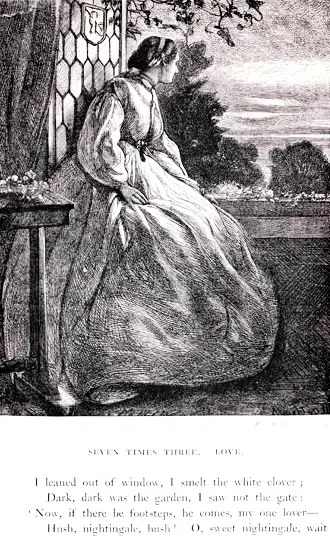Jean Ingelow The Poet of Lincolnshire (March 17, 1820 - July 20, 1897)
Jean Ingelow by Camille Silvy,albumen print, July 1865
Christina
Rossetti writing a letter to Miss Greenwell where she addresses popular
poetess, Jean Ingelow,
5, Upper Albany St.,
London, N. W.
31 December, 1863.
31 December, 1863.
What
think you of Jean Ingelow, the wonderful poet? I have not yet read the
volume, but reviews with copious extracts have made me aware of a new eminent
name having risen among us. I want to know who she is, what she is like,
where she lives. All I have heard is an uncertain rumour that she is aged
twenty-one, is one of three sisters resident with their mother. A proud
mother I should think. If our dear Scotts move away altogether from the
North, I fear my prospect of making your personal acquaintance must dwindle to
the altogether vague. Your kindness, however, has made us no strangers,
even should we never meet—or, rather, never meet here; for one of the last days
of the year the separations and meetings of time should not alone be thought
of. Yours cordially,
CHRISTINA ROSSETTI
Jean
Ingelow writes a letter to Miss Grenwell two months later, 9th
February, 1864,
6, Denmark Place,
Hastings.
My Dear Miss Greenwell,—I have for some time been anxious to write to you, both to thank you for your kind note and for the poems you sent me. I like them much, and really think they are likely to reach the class for which they were written. The poor men here are all of the seafaring class, or I should have given those verses away. Do you know that I have finished a bag for you? I shall send it, I think by railway, for my brother is coming to-morrow as usual, and he will convey it as far as London. The pattern is of my own invention! Is the kettle-holder worked yet? I shall be proud of it. When I next see Miss Rossetti I shall ask for proof that she can do hemming and sewing. . . . It is a pleasure to me that you like those little stories. They have not much in them, but it is an amusement to me to write them; writing for children is so completely its own reward; it obliges one to be simple and straightforward, and clears away some of the mystical fancies in which one is apt to indulge, and which are a mere luxury. They never do us any good, and I am often humiliated by meeting with sensible fellow creatures who ask me what some of them mean. . . .There has been so much leisure here that my new volume is all but finished. It is, however, not to be printed yet. I am, believe me, Very affectionately yours,
JEAN INGELOW
Fellow Lincolnshire resident of the time and
Poet Laureate, Alfred Lord Tennyson, writes to a cousin of Jean Ingelow saying,
To Miss Hollway (of Spilsby) my father wrote
about her cousin Miss Jean Ingelow's poems, A Rhyming Chronicle of Incidents
and Feelings.
MY DEAR MISS HOLLWAY,
Many thanks for your very kind note. I have only just returned to town, and found the Rhyming Chronicle. Your cousin must be worth knowing: there are some very charming things in her book, at least it seems so to me, tho' I do not pique myself on being much of a critic at first sight, and I have really only skimmed a few pages. Yet I think I may venture to pronounce that she need not be ashamed of publishing them. Certain things I saw which I count abominations, tho' I myself in younger days have been guilty of the same, and so was Keats. I would sooner lose a pretty thought than enshrine it in such rhymes as '"Eudora" "before her," "vista" "Sister." She will get to hate them herself as she grows older, and it would be a pity that she should let her book go forth with those cockneyisms. If the book were not so good I should not care for these specs, but the critics will pounce upon them, and excite prejudice. I declare I should like to know her.
I have such a heap of correspondence to answer that I must bid you good-bye. What the German lady says is very gratifying. I shall perhaps see you again in the autumn. My best remembrances to each and all of your circle.
Ever yours truly, A. TENNYSON.
P.S. Strange! that I did not see it. I turned to the title-page, and find that the book is published. I fancied it had only been printed. Forgive my hurry! Well, your cousin will amend, perhaps, the errors I have mentioned, in her next edition.
From Alfred Lord Tennyson: a memoir by his son (Hallam Tennyson) Vol I.
During many years Jean enjoyed the friendship,
and had occasional pleasant interviews with, the late Poet Laureate. It was
after her book appeared in 1863, which, as we have before observed, was the
beginning of her popularity, that Lord Tennyson meeting her, laughingly
exclaimed:
‘I declare, you do the
trick better than I do!’
Possibly the kindly reception Jean always met
with at his hands may have been partly due to her having been of his own
county, Lincolnshire. Be this as it may, the friendly regard of so celebrated a
man must have been a great encouragement to a timid young author at a time
when, a few personal friends excepted, no one took the slightest notice of her
writings. Afterwards, when fame was suddenly accorded her, many other celebrated
men of letters desired to show their admiration of her genius; but Alfred
Tennyson spontaneously owned her talent long before, and I think that must have
always been a pleasure to her. (Some recollections of Jean Ingelow and her
early friends)(1901)
Jean Ingelow by Maull & Polyblank, albumen carte-de-visite, 1860-1865









Comments